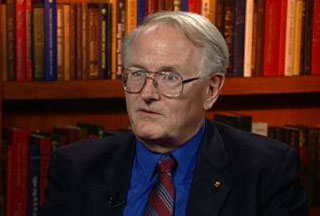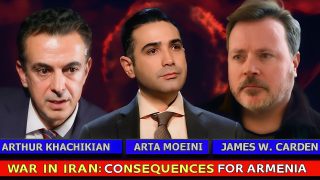Paul A. Goble: “Unless Putin is contained or is replaced, the world will be at risk of a war more horrible than anyone can imagine”

Paul A. Goble is a well-known American analyst. He has held various high positions, such as Senior Associate at Carnegie Endowment for International Peace, Deputy Director of Research Department at Radio Liberty as well as Special Advisor on Soviet Nationality Problems in U.S. Department of State. Now he is a professor at the The Institute of World Politics in Washington.
In the early ’90s he wrote an article on Karabakh conflict, which came to be known as “Goble Plan”. In that background paper, prepared for former Secretary of State Cyrus Vance, he suggested to settle the problem through territorial swap between Armenia and Azerbaijan. This plan received a very negative response particularly in Armenia and was much criticized by Armenian public. Many Armenian politicians, diplomats and analysts still remember this plan as the worst version for the solution of Karabakh conflict.
In an exclusive interview with “168 Zham” Mr. Goble says that he doesn’t think the “Goble Plan” has any place in a resolution now, although he adds: “I remain convinced, however, that it was a good idea at the time and would have prevented much bloodshed and suffering and that it would have opened the way to peace in the south Caucasus, to greater independence for all the countries of that region, and to more democracy in each of them – because it would have reduced the basis for elites to use conflict to promote nationalist ideologies and justify more repression.”
He also gives his assessment for the confrontation between the West and Russia at present time and for its possible consequences. What concerns the decision of Armenian government to join the Eurasian Economic Union, Paul Goble says, that he very much regrets that Armenia joined “the Moscow dominated Eurasian Economic Union, because it won’t get the benefits its leaders say Armenia will.”
– Mr. Goble, as the author of tհe “Goble Plan”, what do you think when you look at this now, could you offer a better, more realistic and more acceptable plan to help to settle the problem? Secondly, what ways do you see for solving Nagorno Karabakh problem now?
– Yes, I proposed what came to be known as the “Goble Plan” in January 1992. I suggested that one way to address the Karabakh dispute was to recognize that the borders between the Soviet republics had been drawn by Stalin to promote rather than resolve ethnic tensions, that they had been changed many times, and that Baku would never agree to Karabakh becoming part of Armenia or independent unless Armenia was prepared to give something in exchange, in this case, the Zengezur land bridge. I believed that ending the carnage and allowing those IDPs and refugees to return home was so important and that peace would benefit both Armenia and Azerbaijan that it was time to think the unthinkable and redraw the border between them.
The United States and the international community following decided, however, that the administrative borders of the Soviet republics must be retained when they were transformed into international inter-state borders. The US declared this on February 6, 1992. The view was and remains that whatever the shortcomings of the borders as they existed in Soviet times, changing them would open a serious can of worms that no one wanted or wants to face.
Because of that and because more than 20 years have passed, I do not think the “Goble Plan” has any place in a resolution now, even as I modified it later in the 1990s, so as to ensure Armenia a land bridge to Iran via an adjustment of the western border of Nakhchivan. I remain convinced, however, that it was a good idea at the time and would have prevented much bloodshed and suffering and that it would have opened the way to peace in the south Caucasus, to greater independence for all the countries of that region, and to more democracy in each of them – because it would have reduced the basis for elites to use conflict to promote nationalist ideologies and justify more repression.
If one starts from the proposition that no borders can be changed by negotiations, they are likely to be changed by violence. But what might be done now? It seems to me that both Armenia and Azerbaijan have a compelling interest in a settlement and even in considering at a bilateral level the kind of territorial adjustments I discussed two decades ago. If the two of them were to agree, the international community would go along.
If borders are not changed, then the reality is that Azerbaijan, which became almost a mono-ethnic society in the intervening years, will again be multi-national with an enormous Armenian population. The international community almost certainly will insist on a close monitoring of the situation, something that many Azerbaijanis may find offensive. And if borders are not changed, Armenia will be unable to move beyond the Masada complex that drives the assumptions of its people and thus will be unable to come to terms with at least two of its neighbors because Armenians will always be worried that however much anyone promises, Armenians living in Turkic countries will face a problematic future.
The best one could hope for and this would be over a very long period would be the emergence of a civic identity in both Armenia and Azerbaijan that would make ethnicity less important than it is now. But that will take a generation or more because ethnicity is the basis of their respective statehoods and national identities. I would like to see this happen, but I fear it will only occur long after my time.
The big problem is that in addition to some members of the national elites in both Yerevan and Baku, there are at least two other players in this drama who don’t want a settlement: Moscow and Stepanakert: Moscow because it benefits from the absence of a settlement, and Stepanakert because almost any settlement short of recognition of it as an independent state would lead to its fall from power.
– The principle of settlement of Karabakh conflict through territorial swap was put on the table in Key West (USA) summit, in 2001, and then-Presidents Robert Kocharian and Heydar Aliev gave their preliminary consent, but the agreement wasn’t signed subsequently. How much consistent was the Key West document with the plan that you had proposed and why did that plan fail?
– The Key West summit came closer to a settlement than any other meeting. Much of what was on the table as I understand it was very close to what I had advocated earlier. The two sides got as close as they did because both President Robert Kocharian and President Heydar Aliyev were simultaneously committed to their nations above their personal power and each, if outside forces had not intervened, would have been able to make an accord stick. Tragically, the outside forces – and Moscow in the first instance – did not want a settlement because the Russian government realized it would lose its major lever in the south Caucasus and be confronted with a significant recession of Russian power.
I cannot stress the negative Russian role too often or too much. As many in Armenia and Azerbaijan have forgotten, no Russian state has ever been able to control the North Caucasus until it controlled the South. Not the tsars, not the Soviets, and not the Russians now. Consequently, in the name of protecting Russian power in the North Caucasus, Moscow will continue to try to maximize its position in the South by playing groups against each other. And it will do that as well because it wants a land bridge to Iran and the Gulf and it wants a wall between Central Asia and the West.
And as one wise Baku observer put it some years ago, in the South Caucasus, for Moscow, Georgia is the way, Armenia is the tool, and Azerbaijan is the prize. Many Armenians to this day assume they have no friends in the world except the Russians. They could not be more wrong, either in terms of the absence of friends elsewhere or in terms of Russian backing.
– Did the helicopter incident move away the sides from the settlement of the conflict even more? Can this kind of ceasefire violations lead to a new war at some point? And an everlasting question: who is interested in the escalation of the situation in Nagorno Karabakh?
– The continuing violations of the ceasefire are a major reason why the two sides must achieve a peace and not just an armistice. Any ceasefire violation has the potential if one or the other side wants to use it in this way to trigger a new war. Among outside actors most interested in keeping the pot bubbling but preventing it from boiling is Russia. The West, that is Europe and the United States, want a stable status quo. Iran also fears instability but its elites are quite prepared to keep playing Armenia against Azerbaijan and vice versa.
– How would you assess the relations between the West and Russia now, particularly in the context of the impact of the western sanctions against Russia and the falling of world oil prices? We know that it has already led to the collapse of the USSR once. How much politicized is this initiative today and what consequences can this confrontation have? Do you think that the two sides are playing “zero-sum game”?
– Vladimir Putin’s invasion of Ukraine has put the world closer to a world war than at any time in the last 50 years. He has violated the three key settlements of the 20th century – that of 1991 which called for respecting the territorial integrity of the post-Soviet states, that of 1945 which said that citizenship is more important than nationality, and that of 1919 which specified that nation states not empires are the proper basis for the organization of the international system. Unless and until Putin is contained and backs down or is replaced and Moscow changes course under a new government, the world will be at risk of a war more horrible than anyone can imagine.
This is not a zero sum game for everyone, however. Both the Russian people and everyone else would benefit if Moscow were not engaged in aggression and in threatening aggression. The only person for whom it is zero sum is Putin: He has taken a position from which he is likely to find it difficult if not impossible to withdraw from and one that he has made central to his being in office as president.
– What impact can have the financial crisis of Russia on Armenia, especially when Armenia becomes a member of the Eurasian Economic Union next year?
– I very much regret that Armenia joined the Moscow dominated Eurasian Economic Union. Not only is it not contiguous to any other members, thus virtually inviting Russian meddling in Georgia and Azerbaijan, but it will not get the benefits its leaders say Armenia will. That was true before the current collapse of the ruble; it is even more true now. Instead, Armenia will remain for Russia a political project and not a vital dynamic economy and democracy. Putin’s Union is a club of authoritarian rulers. By joining it, Armenia will find it harder and harder to maintain its democracy.
– Ultimately, in your opinion, why Armenia’s president Serzh Sargsyan made such a decision on September 3 last year, after more than 3 years negotiations with the EU around signing Asociation/DCFTA agreement? Is this decision more about economics or politics? Was it made in sake of saving his own power, or it should be explained by threats and blackmail for Armenia?
– I can’t see into President Sargsyan’s mind. Decisions typically reflect a multitude of calculations rather than only one. But it seems to me that he has been unable to escape from certain stereotypes that any Armenian leader must if that country is to have a better future. The European Union is far from perfect: it is much too bureaucratic for my taste. But it is committed to openness and democracy and that is why Armenia should have continued to pursue association and ultimately membership in it. Doing so would not have been easy, but the benefits would have made this process worthwhile.
Perhaps the Armenian president did not think that he could look so far into the future or perhaps he feared that the pursuit of EU membership would ultimately undermine his own rule. And at the same time, President Sargsyan has not escaped from the notion I mentioned above, that Armenia’s only friend and defender in the world is Russia. That is simply not true. Russia has dealt with Armenia in a heavy-handed way in the past and continues to do so. I am sure Moscow put enormous pressure on Yerevan not to look to Europe with democracy and freedom but to Eurasia with authoritarianism and restrictions. That may have been a good tactical choice for President Sargsyan; it is not a good strategic choice for Armenians.
Interviewed by Aram Sargsyan

























